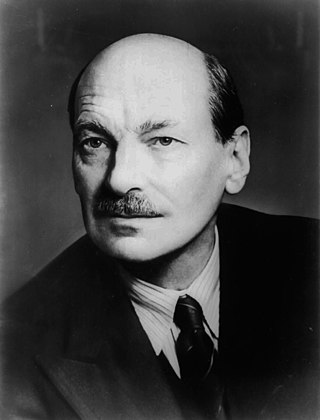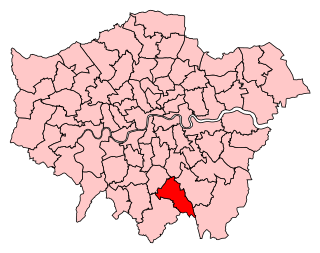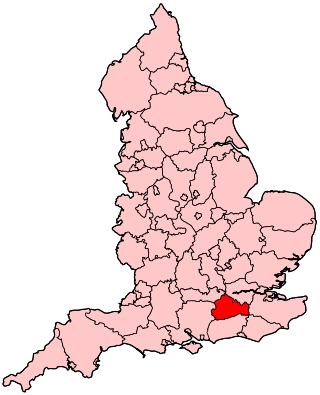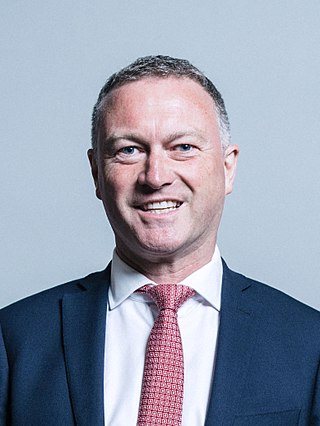Related Research Articles

Sir Henry Urmston Willink, 1st Baronet, was a British politician and public servant. A Conservative Member of Parliament from 1940, he became Minister of Health in 1943. During his time in power he was appointed Special Commissioner for those made homeless by the London Blitz and was involved with the production of the Beveridge Report.

The 1945 United Kingdom general election was a national election held on Thursday 5 July 1945, but polling in some constituencies was delayed by some days, and the counting of votes was delayed until 26 July to provide time for overseas votes to be brought to Britain. The governing Conservative Party sought to maintain its position in Parliament but faced challenges from public opinion about the future of the United Kingdom in the post-war period. Prime Minister Winston Churchill proposed to call for a general election in Parliament, which passed with a majority vote less than two months after the conclusion of the Second World War in Europe.

The 1950 United Kingdom general election was the first ever to be held after a full term of Labour government. The election was held on Thursday 23 February 1950, and was the first held following the abolition of plural voting and university constituencies. The government's 1945 lead over the Conservative Party shrank dramatically, and Labour was returned to power but with an overall majority reduced from 146 to just 5. There was a 2.8% national swing towards the Conservatives, who gained 90 seats. Labour called another general election in 1951, which the Conservative Party won.
The National Labour Organisation, also known simply as National Labour, was formed in 1931 by supporters of the National Government in Britain who had come from the Labour Party. Its leaders were Ramsay MacDonald (1931–1937) and his son Malcolm MacDonald (1937–1945).
Frederic Walter Harris was a British politician and businessman. He was Conservative Member of Parliament in Croydon between 1948 and 1970.

Croydon Central is a constituency created in 1974 and is represented in the House of Commons of the UK Parliament since 2017 by Labour MP Sarah Jones. The seat bucked the trend in national results in 2019, with Labour holding the seat with a slightly increased majority.

Croydon South is a constituency created in 1974 and represented in the House of Commons of the UK Parliament since 2015 by Chris Philp, a Conservative.
Croydon South was a constituency represented in the House of Commons of the Parliament of the United Kingdom. It elected one Member of Parliament (MP) by the first past the post system.

Epsom was a borough constituency represented in the House of Commons of the Parliament of the United Kingdom. It elected one Member of Parliament (MP) by the first past the post system of election. From its creation in 1885 until its abolition in 1974, it was won by eight Conservatives. The winner took less than 50% of the votes in its contested elections once, in 1945, receiving 49.9% of the vote in a three-party contest. Six elections, the last being a by-election in 1912, were uncontested.
Wednesbury was a borough constituency in England's Black Country which returned one Member of Parliament (MP) to the House of Commons of the Parliament of the United Kingdom from 1868 until it was abolished for the February 1974 general election.
Parliamentary by-elections in the United Kingdom occur when a Member of Parliament (MP) vacates a House of Commons seat during the course of a parliament.
The 1940 Croydon North by-election was a parliamentary by-election held in the British House of Commons constituency of Croydon North on 19 June 1940. The seat had become vacant when the Conservative Member of Parliament Glyn Mason had resigned. Mason had held the seat since the 1922 general election.
Croydon was a constituency in the House of Commons of the UK Parliament from 1885 to 1918. As with most in its lifetime following the Redistribution of Seats Act 1885, it was a seat, that elected one Member of Parliament (MP) by the first past the post system of election.
The 1940 Kettering by-election was a parliamentary by-election held on 6 March 1940 for the British House of Commons constituency of Kettering in Northamptonshire.
The 1940 Newcastle upon Tyne North by-election was a parliamentary by-election held on 7 June 1940 for the British House of Commons constituency of Newcastle upon Tyne North.
The 1932 Croydon South by-election was a by-election held on 9 February 1932 for the British House of Commons constituency of Croydon South in Surrey.
The 1945 Middlesbrough West by-election was a parliamentary by-election held on 14 May 1945 for the British House of Commons constituency of Middlesbrough West.
The 1940 Battersea North by-election was a parliamentary by-election held on 17 April 1940 for the British House of Commons constituency of Battersea North in the Metropolitan Borough of Battersea.
The 1940 Leeds North East by-election was a parliamentary by-election in England held on 13 March 1940 to elect a new Member of Parliament (MP) for the House of Commons constituency of Leeds North East.

On 29 November 2012, a by-election was held for the UK House of Commons constituency of Croydon North in the London Borough of Croydon. The by-election was caused by the death of its Member of Parliament Malcolm Wicks. It took place on the same day as by-elections in Middlesbrough and Rotherham. The by-election was won by Steve Reed of the Labour Party.
References
- ↑ "1948 By Election Results". Archived from the original on 14 March 2012. Retrieved 12 August 2015.